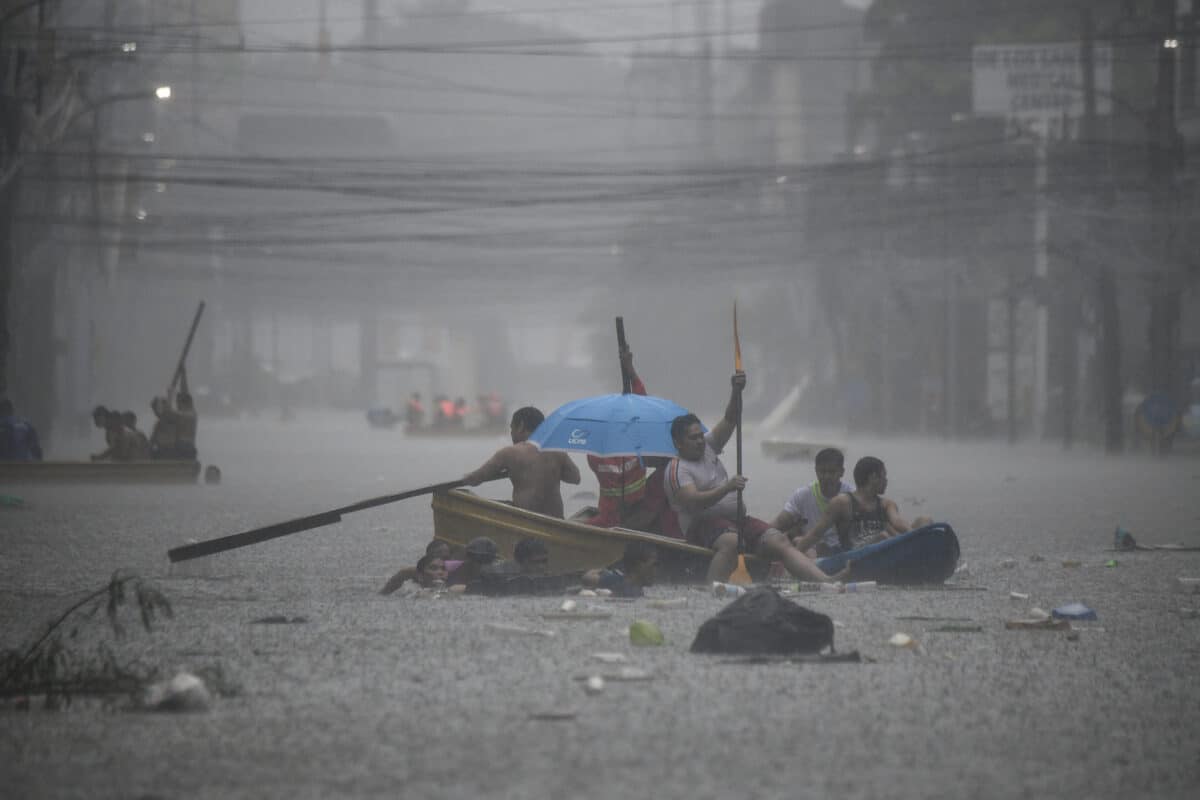Metro Manila flood control plan needs update – Romualdez, Momo

Rescuers paddle their boats along a flooded street in Manila on July 24, 2024, amid heavy rains caused by Typhoon Carina (international name: Gaemi). | Photo by Ted Aljibe, Agence France-Presse
MANILA, Philippines — The flood management master plan for Metro Manila must not only be implemented but also updated to avoid a repetition of the severe flooding in the region recently, House Speaker Ferdinand Martin Romualdez and Surigao del Sur 1st District Rep. Romeo Momo said in separate statements on Friday.
“There is already a flood control masterplan in place. We just need to follow, update, and implement it,” Romualdez said.
“We can’t avoid stronger storms and heavier rainfall due to climate change. We need to revisit and update our flood control masterplans, implement them fully, and consider relocation for residents in low-lying areas, particularly in places like San Juan and Marikina,” he added.
According to Romualdez, the House will review the master plan.
“Our oversight functions include ensuring accountability in budget spending. We will review if funds have been used effectively and efficiently, and address any misuse,” he noted.
Article continues after this advertisementMeanwhile, Momo, who heads the House Committee on Public Works and Highways, said that relevant agencies must swiftly implement the Metro Manila Flood Management Project and other projects in all major river basins and principal rivers across the country.
Article continues after this advertisement“It is about time that all concerned agencies — the DPWH [Department of Public Works and Highways], MMDA [Metropolitan Manila Development Authority], LGUs [local government units], and other officials — work together to adhere to this master plan. It has been a long time coming,” he said.
“It is not enough that we are prepared for the recovery and rehabilitation, but what is more important is that we are ready for any type of disaster, especially in terms of flooding because this has taken too much from us — lives, properties, livelihoods, and so much more,” he added.
Flood control vital to economic recovery
Momo stressed the importance of the government mitigating flooding while the country was still recovering from the economic slump brought on by the COVID-19 pandemic.
“We’re at the cusp of an economic recovery. All our industries are booming, but if we continue to let flooding dictate the way we run and do our business, we’re going to lose that momentum,” he said.
According to Momo, the $500-million Metro Manila Flood Management Project received funding from the World Bank and the Asian Infrastructure Investment Bank (AIIB) for $207.6 million each in 2017, while the Philippine government is tasked to provide the remaining $84.79 million.
The project, Momo said, aims to achieve the following:
- build a dam in the upper Marikina River catchment area
- eliminate long-term flooding in the flood plain of Laguna de Bay
- modernize Metro Manila’s pumping stations
- improve flood forecasting and early warning systems
- improve institutional arrangements for better flood management
Momo said he would meet with various officials of the DPWH to check on the implementation of the project.
“Many of the projects are yet to be bidded out and some are still ongoing. We need to double time with our flood infrastructure projects. The money is already available. There’s strong support from Congress for the completion of these projects. Let’s make it happen already,” he said.
Funding from national budget
In addition, Romualdez said that flood control projects would be funded under the P6.352 trillion national budget, which the Department of Budget and Management was expected to hand over to Congress on Monday, July 29.
“We are fully prepared and have anticipated this, as there is a process that includes a budget call from the past few months. We are ready to scrutinize, read, review, and, if necessary, refine and amend the budget to be submitted by the DBM and the Executive,” Romualdez said.
“Addressing climate change and its effects on rainfall is a work in progress. We need to focus on flood control programs, advisories, and possible relocation to prevent future incidents,” he added.
Different roads and communities in Metro Manila and nearby provinces were flooded from Wednesday to Thursday due to nonstop rains caused by the southwest monsoon and intensified by Typhoon Carina.
This has forced the national government to place Metro Manila in a state of calamity. Last Wednesday, Navotas Rep. Toby Tiangco said that Navotas and its neighboring cities would not have experienced severe floods if only the Tangos-Tanza Navigational Gate had not been damaged.
However, a barge towed in by tugboats damaged the floodgate, leading Tiangco to mull possible legal action against the company that owns the barge.
Earlier, Senator Grace Poe, who heads the Senate Committee on Finance, said that agencies involved in flood control operations would be scrutinized at the start of Senate deliberations on the proposed 2025 national budget.